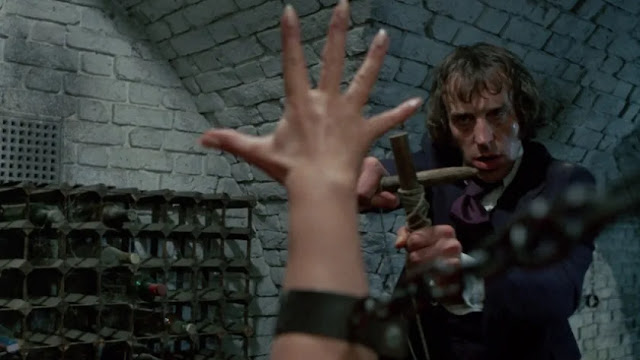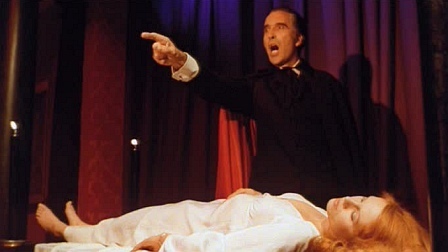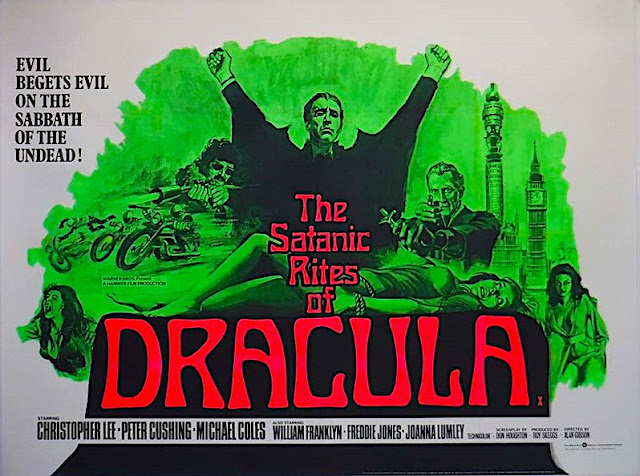
In
Victorian London's Whitechapel section, our story is told in flashback,
as Dr. Henry Jekyll (Ralph Bates) commits his recent experiences to
paper, by way of explanation and confession before the police come sot
take him away. The brilliant doctor seeks an "elixir of life" that will
grant greatly extended longevity, if not outright immortality, but he
needs fresh female reproductive organs for his experiments. To achieve
this ghastly end, he at first employs the services of Byker (Philip
Madoc), a shady local morgue worker whose banter with the doctor
contains more than a hint of inferences of necrophilia, and who knows
the historically infamous "resurrection experts" Burke (Ivor Dean) and
Hare (Tony Calvin), a pair of the scurviest gravedrobbers imaginable.
They make their questionable living by supplying recently-interred
corpses to medical schools, and now Dr. Jekyll, and, again, Burke's
banter with the doctor implies "sepulchral sexy-time." No, Jekyll isn't
that fucked-up, but he feverishly works 'round the clock in his
apartment's lab for days on end, arousing the interest of an incredibly
intrusive neighbor family, a trio of characters like something straight
out of a sitcom and led by man-hungry Susan (Susan Brodrick), who has
her sights set of the studly Dr. Jekyll.
While fielding constant
interruptions and intrusions from Susan, Jekyll somehow manages to make
progress with his experiments, successfully extending the life of a fly
to over the human equivalent of 200 in human years. But the experiment
yielded an unexpected side-effect, specifically that it caused the fly
to transform from male to female. With that, Jekyll shifts experimental
gears and instead focuses on creating what is in effect a sex change
serum, meaning his quest requires ever more reproductive organs from
deceased women. His timing is bad, however, as there is a shortage of
freshly-dead girls, so, at their suggestion, Burke and Hare simply
murder what is needed, and the doctor takes the bits that he requires,
leaving everything else for sale to eager medical schools, all with no
questions asked. Anyway, while dodging the advances (annoyances) of
Susan, Jekyll succeeds in his task, tests the formula on himself, and
transforms into toothsome , randy, and evil Martine Beswick, who
immediately begins manually exploring her newly-minted tiddies. (In
actuality only one tiddy, but I'll take what I can get.

Sister Hyde (Martine Beswick) checks out her newly-minted bodaciousness.
When
the neighbors get wind of a woman in the doctor's apartment and mention
that they are curious about her, Jekyll notes that she is his sister,
"Mrs. Hyde," a recent widow.
As the corpses of young women begin
to pile up, the hunt is soon on for "the Whitechapel Murderer"
(translation: "Jack the Ripper"), while simultaneously the activities of
Burke and Hare are uncovered and the pair at met with grim fates at the
hands of a lynch mob. But more serum is needed to refine the process
and hopefully make it
more controllable for the user, so Jekyll, getting personally
proactive, sets out at night into London's pea soup fog in search of
prey.
Dr. Jekyll takes matters into his own hands. But
Jekyll still needs fodder for his deviant delvings and the authorities
have a pretty good description of the killer, so Jekyll gets around that
by transforming into Hyde and murdering his mentor, the lust-driven
Professor Robertson (Gerald Sim), who suspected Jekyll as being the
killer, but was thrown off the trail by witnessing a woman leaving
Jekyll's abode while observing the residence during a police stakeout,
after which he tells Jekyll of his knowledge of her existence, thus
ensuring the horny old sod's demise in Hyde's homicidal arms. Then, as
Hyde, Jekyll hits the nighttime cobblestones in search of a victim.
Mrs. Hyde (Martine Beswick) stalks the night. But
the maniac's identity has been figured out by a blind hurdy-gurdy
player who has observed events on the streets with his keen ears
throughout the narrative. He is coerced into giving up Jekyll to the
police, and in no time Jekyll's home is invaded by cops. Jeky'll
escapes, but by this time his control over the transformation is random
at best, with Hyde struggling for dominance, but during a perilous
escape attempt that finds Jekyll hanging for dear life from a building's
sill, he changes into Hyde in front of dozens of witnesses (including
Jekyll's nosy neighbors), but, deprived of her masculine half's
strength, Hyde loses her grip and perishes upon impact with the street,
the corpse being a disturbing fusion of both male and female aspects.
And so ends the bloody trail of the Whitechapel Murderer.
Simultaneously, so ends this dull, plodding slog of a film.
I
first saw DR. JEKYLL AND SISTER HYDE in edited form at some point in
the late 1970's and thought it pretty good at the time. But that was as
perceived v=by 11-year-old eyes, so I had no idea that a lot of the
film's fat had been excised for commercials. Seeing it uncut at age 57
was a chore, and I could not wait for it to end. I was something like
fifteen minutes in when I said aloud "Boy, this movie is BORING!"
Basically
the J&H story and kind of a proto-slasher, as it blends Jack the
Ripper and Burke and Hare into the mix, this late Hammer entry came
during a period when the company's signature red paint blood and risque
heaving bosoms were being rendered obsolete thanks to more explicit fare
from other international studios, so my guess is it was made as a bid
to up their sex & violence ante by way of the then-shocking sexual
reassigment angle, only using it as hoped-for titillation, but in
actuality very little of any interest is done with it. In that
department the film fails utterly, as, despite the presence of her royal
fineness Martine Beswick veteran of two classic James Bond films (FROM
RUSSIA WITH LOVE and THUNDERBALL, to be precise), there is fuck all
that's sexy going on here.
The characters, nearly the entire lot
of them, are pretty much ciphers about whom it is impossible to care
and who just play their roles while offering nothing else, with the
notable exception of Gerald Sim's super-horny Professor Robertson. The
guy is very clearly shown to be a poon-hound of the highest calibre, and
he's a delight whenever she's on screen. At least the film wields
considerable visual atmosphere, with a Victorian London of cobblestones,
unsavory street people, dark shadows cast by gaslight, bawdy whores, an
apparently mad homeless woman who sings to herself throughout the
narrative, and pea soup fog, along with the sumptuousness of Jekyll's
fancy tenement digs that come complete a full science lab whose
aesthetics are at odds with every other set in the movie.
But
perhaps the biggest disappointment of the film is that it was written by
Brian Clemens, the co-creator/producer/writer of THE AVENGERS — the
classic British spy TV series of the 1960's, not the Marvel superheroes —
a man who often wrote with great cleverness, frequently with a touch of
the surreal and bizarre. Even his weakest AVENGERS script blew this
turgid turd straight out of the water. Thankfully, Clemens would redeem
himself during his time at Hammer by writing, directing, and
co-producing CAPTAIN KRONOS — VAMPIRE HUNTER, which was shot in 1972 but
released in 1974. It bore all of the earmarks of Clemens at his best
and weirdest, but more on that one some other time (possibly next year).
With
all of that said, I am sad to note that DR. JEKYLL AND SISTER HYDE is
without doubt the weakest Hammer film that I have seen so far, and I am
most of the way through their entire roster. We shall see if anything
from Hammer can rank lower in my estimation of their individual efforts.
At least the censored version for TV was shorter and moved more
briskly, thus, perhaps inadvertently, preventing the TV version from
committing the cardinal sin of cinema by boring the viewer.
This film should have been released in today's climate of gender politics. There would be riots in the streets.

Poster for the U.S. theatrical release.


























































